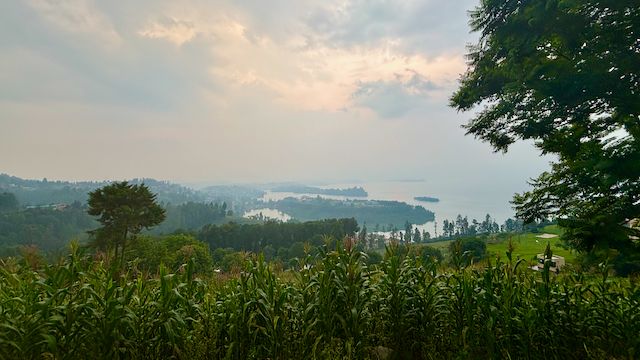View of Lake Kivu, seen from Kamembe in Rwanda
Arriving in Kamembe on one of the last days in January –
– we head straight for Lake Kivu, the lovely lake which serves as part of the border between Rwanda and the Democratic Republic of Congo.
And it really is lovely – and underappreciated – with pristine waters, surrounded by lush green hills and volcanic mountains, and with more than 40 islands, some in Rwanda, some in DRC.
Cyangugu town is on the River Ruzizi, on the Rwandan side of the border, and this is where we begin our exploration.
Cyangugu port
Still water runs deep in Lake Kivu
Spanning over 2,700 km², Lake Kivu is one of the Great Lakes of Africa. It sits on the East African Rift, which means it’s part of a tectonic zone where volcanic activity is common.
Lake Kivu is also one of the few lakes in the world capable of sudden limnic eruptions. What on earth is a limnic eruption, you ask? Or at least, I did. One of nature’s rarest hazards, it turns out, where dissolved CO2 suddenly erupts from the depth of the lake, forming a gas cloud, capable of asphyxiating everyone around.
Volcanic activity! Limnic eruptions! This all sounds a bit scary, you might think. But no worries, safety measures are in place to monitor the situation.
Sitting here in a boat, looking out at the lake surrounding me, it is odd to think about all that energy. Out here in the middle of it, everything looks serene. Peaceful.
And over there is Congo, just minutes away. So near I can practically touch it. And yet so difficult to visit.
Nkombo, the largest island in Lake Kivu
Lake Kivu has a number of islands, all adding to the somewhat otherworldly feel here.
Our boat journey this afternoon is a nice outing in its own right. The scenery is spectacular. However, our main goal is a hike – on Nkombo, the largest island in the lake, and the largest in Rwanda.
23 km2 Nkombo Island is home to a lively community that relies on just this ecosystem – the land and the lake – for its livelihood and survival. On land, the forests and slopes provide growing conditions for agriculture. But even more importantly, Lake Kivu provides fish and freshwater, as well as a major transportation route for people in the South Kivu region.
Tourism will probably also play an increasingly important role here; there are bicycle trails and bikes for rent. Bird watchers will no doubt find it interesting. Kayaking and stand-up paddle boarding is available. You can go fishing and take a boat trip around the island. Or you can simply immerse yourself in Rwandan village life, and maybe even learn a few words and phrases in Mashi, the local language.
But tourism is for another day. Today, we are the only ones here.
Hiking across Nkombo Island
After a relaxing 30-minute boat trip, we climb ashore on Nkombo Island. The first thing I notice, is a man working a machete. I have to admit it sets me on edge a bit, even though it has been nearly a year since I visited the memorials to the Rwandan genocide, where machetes played a leading part. And Lake Kivu did play a significant part in those days, as many of the people that were killed during the genocide were thrown into the lake.
But that has nothing to do with him, of course. It is not his fault rebels weaponised a common agricultural implement. I remind myself to get it together.
But I soon forget all about machetes and the gruesome events of the 1990s, when this colourful crowd greets us with smiles and music, with singing and dancing the Gusama, showing off the island’s tradition and culture.
That girl in the red dress.
On our hike across the island, we pass several little villages. We learn about building traditions on Nkombo Island –
– food gathering and preparation –
Avocados and fish from Nkombo Island are brought to Bukavu across the border in the DRC and sold.
– churches, schools and community –
– and local flora and fauna.
Soon we have crossed the island, and we’re at the lake once again.
It is possible to stay the night on Nkombo Island, in newly built lodges, and in that way support the local community. Sadly, we don’t have time, as we plan to cross over to the DRC tomorrow, to visit gorillas in Kahuzi-Biega National Park. (As it turns out, our plans are impeded by M23 guerillas on the move.)
Two boats take us back across to Cyangugu.
(Not sure why we need to change boats halfway… but I suppose I don’t have to understand everything.)
Life on Lake Kivu
Time for a spot of night fishing. Although… I have seen how they catch fish on the great lakes in Africa. The poor creatures are thrown on the deck and left to die slowly. It is inhumane, so no fishing for me, night or day. If you are going to kill fish, do it as fast as possible!
Lake Kivu’s fishing boats make a lovely motif, though, especially at sunset.
But better then, with a beer at this watering hole with a view, up in the hills of Kamembe.
All photos by David Røgler, Melissa G. Mitruen, and myself unless otherwise noted.
Lake Kivu: Africa’s mystic great lake is a post from Sophie’s World
